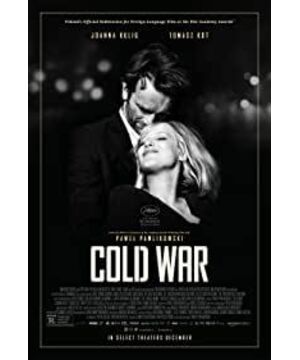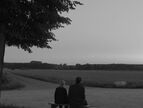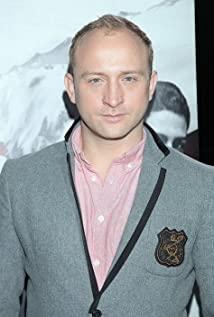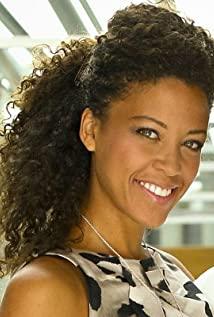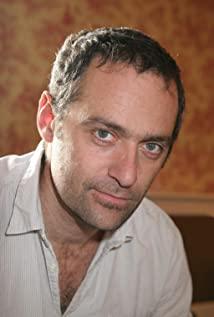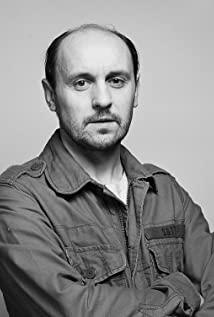"Two hearts, four eyes facing each other, tearful eyes all day and night, black eyes, you can cry, but you can't be together."
At the end of the film, Victor and Zura return to the abandoned church at the beginning of the film, hold a wedding for only two people, and then swallow pills and wait for the moment of death. Zura said, otherwise we would sit across the street, or the scenery would be better. I couldn't hold back the tears anymore, and I fled to the back of the theater, only to find that there were many tearful eyes in the silent theater. The entire film is a cross between Polish and French, the simplest English subtitles, and even the dialogue is pitiful, but touching. From 1949 to 1964, across the capitalist and socialist camps, across cultural differences, across personal destiny, through Warsaw, Berlin, Belgrade, Paris, churches, training rooms, theatres, bars, concert halls, the starry sky of Paris, The Laogai farm, back to the ruins of the earliest church, finally ended heroically.
In 1949, Victor, a talented composer, discovered Zura, a wild and beautiful young girl with a talent for singing, during his travels collecting folk music and entertainers. Love was hot and stirring between the two young men. However, the increasingly depressing political atmosphere made Victor make the decision to go to the free world. Victor did not wait for Zura that night. He crossed the boundary between East and West Berlin and went to Paris, because the two agreed that in case of When we got separated, we went to meet at that bar in Paris, where Victor waited every night until Zura finally showed up two years later. After parting, Victor returned to his then girlfriend Julianne, who asked you which lover you were looking for? He said I was with the woman of my life, woman of my life.
In 1954, Zula went to Belgrade to perform and found Victor sitting in the auditorium. He couldn't hide his excitement, but the audience Victor was kidnapped by the Polish spy agency. In 1956, Zula used an international marriage to win the chance to go to Paris with Victor. They embraced in the Parisian night. Life could have ended here, but the days in Paris went against Zula's original intention of music, and she fled, fled back to Poland.
In 1959, Victor crossed the border back to Poland to find Zula, waiting for him on charges of espionage and 15 years in prison on a labor camp. Zula came to visit Victor listening to the mournful gunshots of the Laogai farm. For Zula, Victor lost the beautiful fingers that used to dance on the piano. Zura married the head of the art troupe in exchange for Victor's ten-year sentence.
In 1964, they decided to die together forever.
The theme song "Two Hearts" appeared five times in the film. When Victor was collecting style, the little girl sang the original love song "Two Hearts", which was not suitable for her age. The second time was Zura. She performed the beautiful "Two Hearts" adapted by Victor on stage. For the third time, Zula told Victor that the organization asked her to monitor Victor's words and deeds, whether she believed in God, and whether she had foreign currency in her hand. , Victor was displeased, but the wild girl jumped into the river and sang this song. Later, the song reappeared on the stage, when Zula matured. Later, when they reunited in Paris, Victor adapted the song into the jazz style that was popular at the time. This is when this song is best presented. Zula is mature and sexy, but her wild beauty is overwhelmed by pop culture.
"Two hearts, four eyes facing each other, tearful eyes all day and night, black eyes, you can cry, but you can't be together."
The film uses an old-fashioned narrow screen, and the camera language is old-fashioned, telling their stories bluntly. No complaints, no deliberate conflict, their complicated love makes all other people and events a background and foil, although Sichuan and Chongqing are not easy, although death is the end, love is not a great praise but the ultimate decision.
The film also shows the background of the story. Some are even cultures and stories specific to socialist countries. At the beginning of the film, musicians went to the folk to collect folk songs and recorded the original folk songs to enhance and artisticize them; young singers were selected from the working people to form a literary and artistic group from the basic education, the International Youth Carnival of Socialist Countries in East Berlin In 1964, when the political atmosphere eased a little, the art troupe sang a Mexican-style song and dance, with some shadow of an oriental song and dance troupe.
On the other side of Paris, Victor started from scratch, from keyboards for jazz bands, to suspenseful film scores, and later to jazz-style adaptations of Polish music. In the process, under the so-called free air on the banks of the Seine, the survival of New Wave movies and jazz music slowly polished the two hearts of Polish folk music. So there are reasons to flee Paris.
I like the performance of the heroine Zura. She is a metaphor for the flame of love igniting Victor, who was originally as calm as water. Joanna Kulig's wonderful performance in "Cold War" won the Best Actress Award at the 31st European Film Academy Awards. She performed without any trace of performance in the film, but she interprets Zura's growth, from a wild country girl, to a sexy and tangled jazz singer in Paris, and then to a decisive decision after the vicissitudes of life, all in one go. The singing of the heroine, who graduated from the Vocal Department of the Chopin Conservatory of Music, added a lot of color to the film.
This film, with the background of the Cold War and complicated love, uses an international language, not artificial, not embellished, and natural. You can see the entanglement of intellectuals in "The Unbearable Lightness of Life", the pain and separation of "Tiananmen", and even the desperate love of "Like water for chocolate", but above these works is human nature itself, human nature. Freedom, the nobility and determination of human nature. good movie.
View more about Cold War reviews


